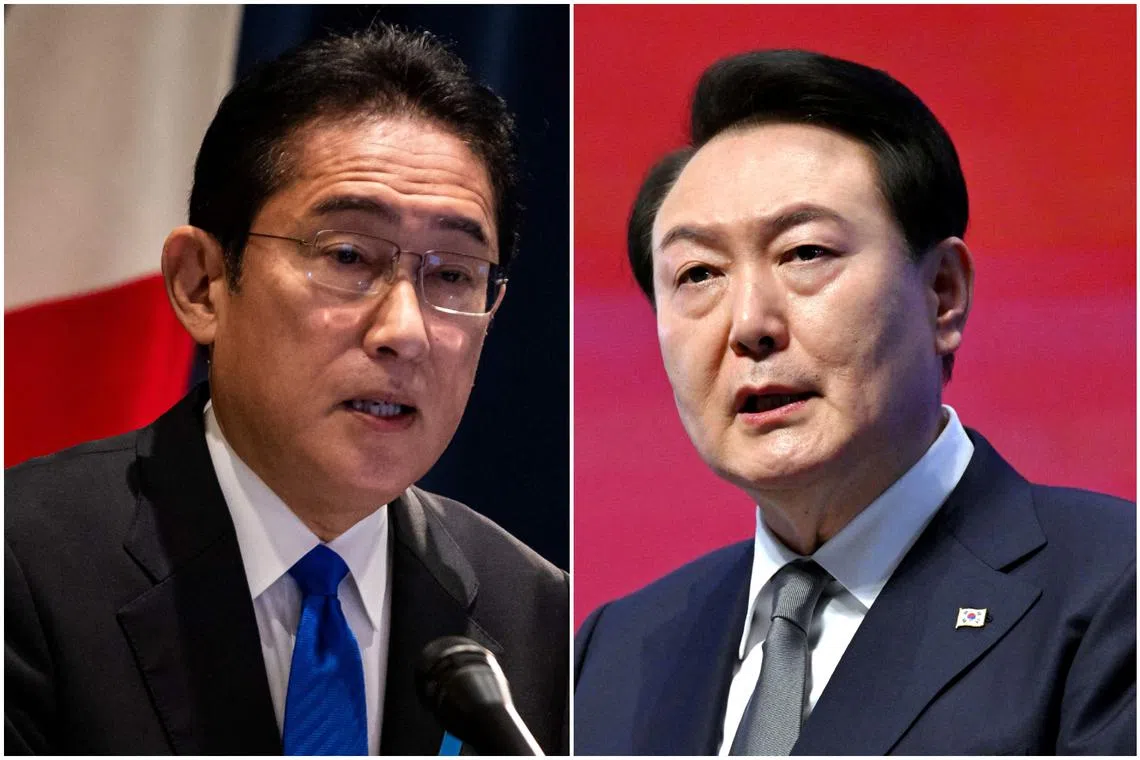‘Omurice diplomacy’ on cards as Japan PM Kishida welcomes South Korean President Yoon to Tokyo
Sign up now: Get insights on Asia's fast-moving developments

Japanese PM Fumio Kishida (left) is pulling out the stops for the visit by South Korean counterpart Yoon Suk-yeol.
PHOTOS: AFP, REUTERS
Follow topic:
TOKYO/SEOUL – More than four million South Koreans have thronged cinemas to catch animated film The First Slam Dunk, which has broken records to become the most-watched Japanese movie in the country.
And in Japan, where one in three foreign tourists so far this year has been South Korean, the song that topped the chart this week was OMG by South Korean girl group NewJeans.
The love-fest extends beyond pop culture into politics, as South Korean President Yoon Suk-yeol lands in Tokyo on Thursday
And Japanese Prime Minister Fumio Kishida is pulling out all the stops by offering up a whiff of nostalgia.
After a summit meeting and joint news conference on Thursday, the two leaders will continue talking – first over a sukiyaki (beef hotpot) dinner in Ginza, and then over omurice (omelette rice) at the 128-year-old restaurant Rengatei.
Mr Yoon, whose father once taught at Hitotsubashi University in Tokyo, told the Yomiuri newspaper in an interview on Tuesday that his earliest impression of Japan was of a clean country with honest people.
“I expect that normalising bilateral relations will not only serve the interests of both countries, but also will send a very positive sign to the international community,” he said.
The detente has been cheered not only by the United States – their common security ally – in the light of shared concerns over North Korea and China, but also by the leaders of Australia, Britain, Canada, Germany and the European Union.
Mr Yoon’s two-day visit, which will also include meetings with business leaders and students, will mark a restart of the “shuttle diplomacy” between the two nations that has been on hold since December 2011, as bilateral ties were soured over arguments over history and a territorial dispute. In August 2012, then South Korean President Lee Myung-bak stoked tensions by landing on the contested Dokdo/Takeshima islets.
There are high hopes that Mr Kishida will invite Mr Yoon to his home town of Hiroshima in May as an observer to the Group of Seven summit. The Japanese Premier is also reportedly planning a reciprocal visit to Seoul this summer.
Mr Yoon said he looks forward to “frequent dialogues” with Mr Kishida “as often as is necessary, without any restrictions by formalities and time”.
This caps a remarkable turnaround, just three years after South Koreans were boycotting all things Japan,
On March 6, Seoul announced a resolution to their stand-off over wartime labour, with a government-backed fund to be set up with voluntary donations
This follows a 2018 South Korean top court order to seize the assets of Nippon Steel and Mitsubishi Heavy Industries for forced labour during Japan’s 1910 to 1945 colonial rule of the Korean peninsula.
Japan said the verdict defies international law given their 1965 accord to normalise relations, with a US$800 million payout, which was struck on the condition that all claims related to the occupation are to be fully settled.
In a seemingly tit-for-tat move, Japan struck off “untrustworthy” South Korea in 2019 from a whitelist of preferential trading partners.
This led to tougher export controls on sensitive material such as hydrogen fluoride, which South Korea relies heavily on for its chips industry.
In the spirit of letting bygones be bygones – South Korea says Japan has “transformed from a militaristic aggressor into a partner”, while Japan calls South Korea “an important neighbouring country” – the two nations will likely reopen trade and security talks.
But six in 10 South Koreans are against the wartime labour resolution plan, and thousands turned out in protest last Saturday.
The opposition, as well as three surviving plaintiffs, have called it a “national disgrace” and “humiliating diplomacy”.
It will be up to Mr Yoon, who told the Yomiuri that Seoul will not exploit history for political gain, to navigate these headwinds.
Japan has welcomed his plan, under which South Korean steel giant Posco announced a four billion won (S$4.1 million) contribution on Wednesday. The American Chamber of Commerce in South Korea, as well as Japan’s influential business lobby Keidanren, are also considering donating to the fund.
Meanwhile, Tokyo is close to reinstating Seoul on the trade whitelist, while Japan hopes military intelligence-sharing can be normalised through the General Security of Military Information Agreement that was once on the brink of termination.
“This will be an important moment to end the negative spiral and to establish once again a situation that will allow for genuine exchanges between the two nations,” South Korea’s national security adviser Kim Sung-han said on Tuesday.
Washington is mulling over three-way deterrence talks
Professor Rory Medcalf, head of the National Security College at Australian National University, told The Straits Times that the democratic response towards China has been blunted, with Tokyo and Seoul at loggerheads.
“There is a lot of frustration that Japan and South Korea have not been more closely aligned – they’re both large, engaged regional economies that are militarily very capable,” he said.
“We hope they can keep working together to bridge their differences.”
Dr Lee Myon-woo of the Sejong Institute think-tank said he expects the gamut of discussion topics to include cooperation with the US on the economy and security.
On South Korean hopes for Japanese reciprocity on the wartime labour plan, Dr Lee told ST: “It will not be easy for Prime Minister Kishida and his government to officially say that companies would donate to that fund – at least not publicly – as it goes against their official stance.”
“But I hope there can be some changes unofficially,” he added, noting that Japanese Foreign Minister Yoshimasa Hayashi had after all, mentioned that Tokyo “would not oppose it if the companies were to voluntarily donate to the fund”.

